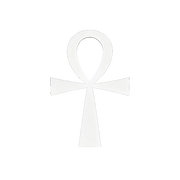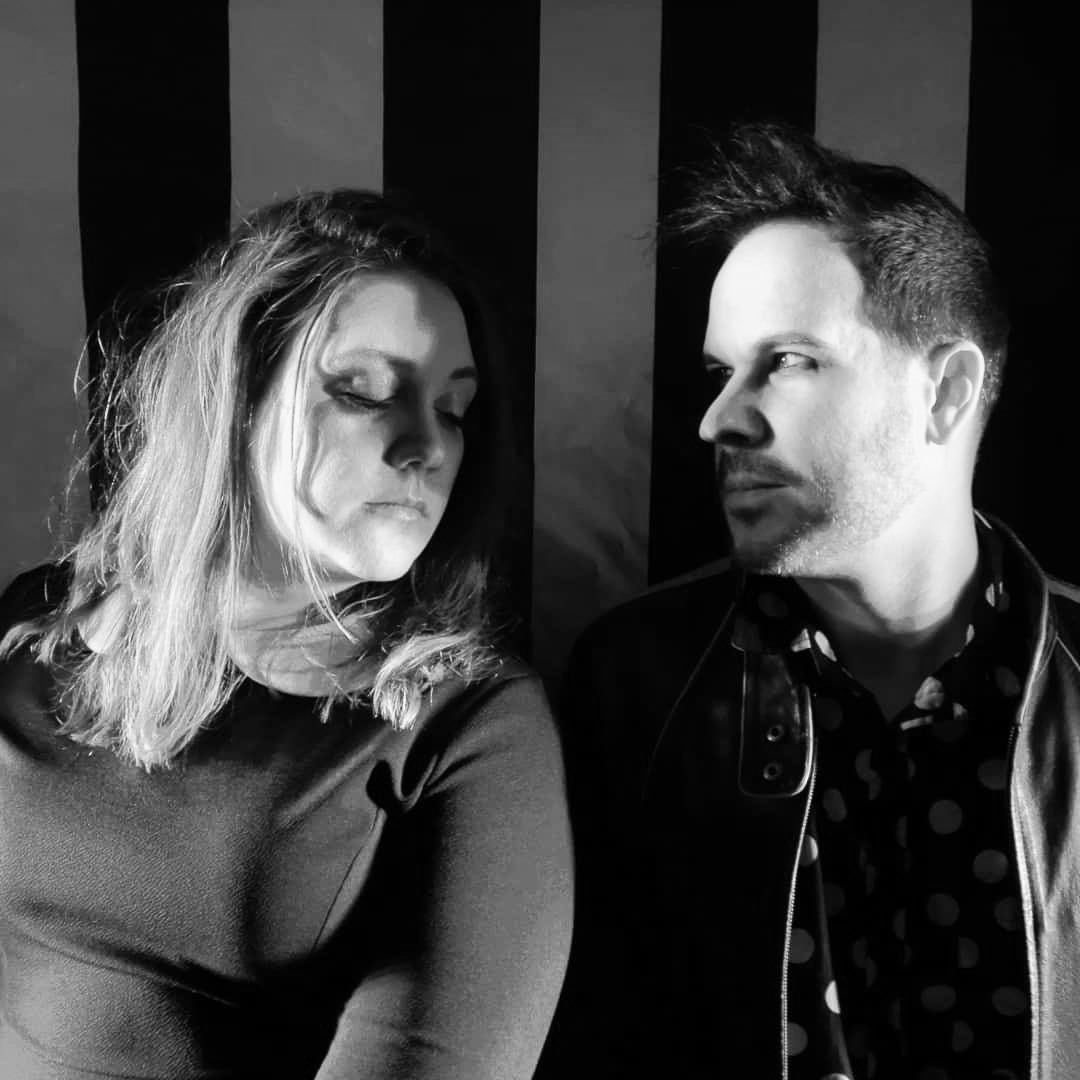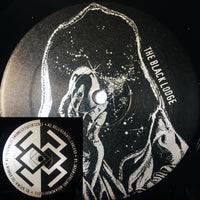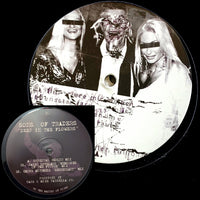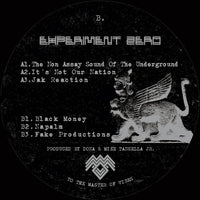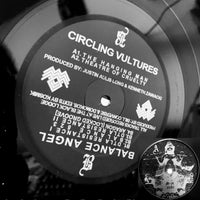Bellhead are a post-punk, male-female duo band from Chicago. Two basses and a drum machine. No Guitar, No BS. Consisting of High Bass/ and Lead Vocalist Ivan Russia, (Ahab Rex, Mr. Russia, and Sheriff Scabs) partnered with Low Bass/Vocalist Karen Righeimer (Fashion Bomb, Team Cybergeist, W.O.R.M, Now I’m Nothing, mindfluxfuneral, Bethany Thomas, Pigface)
Nek from 27 club conducted an interview with Bellhead who are getting prepared for their midwest fall tour.
Nek: Glorious, and we are recording. So first off, congrats on your EP. It's a killer.
Karen: Thank you, appreciate it.
Nek: So we will be doing a solid set of questions and it will be going up on our blog. Does that sound ok to you?
Karen: Yeah, that's fine.
Nek: Ok, question number one: describe your favorite and least favorite part about being a musician.
Ivan: Well, I mean, I think the favorite part is the... is making something that didn't exist before that brings joy to myself. It's like, I write for me, and then for Karen, and then for the audience, you know. So, seeing that realized, like when you're playing a show, from a song that you worked on from nothing, and having it up, and having it work, and really connect. It's like, "Yes!" this was totally worth doing. You know, and it's very gratifying to connect with a group of people, you know, sweaty strangers, about something that you just dreamt up, you know. That's the great part. Then there are the parts where just a lot of dumb stuff has to be done.
Karen: I think you never realize as musicians, and especially as the two piece, you know, how much work and business has to go into it. Like it's not just writing music, playing shows, and having fun; this is a job, and sometimes that stuff can get difficult to do. You know, we'd love to just play music nonstop all the time.
Ivan: But even in the aspect of playing music, it's like, if we're doing shows we have to move our gear. So it goes from the vehicle, to the venue, from the venue, back to the vehicle, and then wherever we're staying. We're moving our gear multiple times a day, and like, when you start a band you don't think about it as...
Nek: The small things.
Karen: Right (laughs)
Ivan: So there are things like that. I was once in a Wal-Mart when they announced it was closing and I measuring a bed sheet, and I looked at my band mate, that I was with at the time, and went "Oh, yeah, this is why we started a band. Right?" Like, cause we needed this for a show, and it's all those things that you don't realize. Like just, "I'm going to have to figure out that. We're going to have to figure out this. What about that?" And so then we're like "Hey remember when we played music?"
Karen: (Laughs) And not that we don't enjoy all of the things, but just sometimes it gets a little old.
Ivan: Yeah, there's accounting to be done and record keeping. Things have to be shipped, and you know, like there's just a...
Karen: Oh yeah you got to crunch our numbers. (Laughs)
Nek: Next question, that is after the previous one, interested to know if you think that music long term can be viable, even if you do not view it as a business model or do you?
Karen: You know, the music industry is not what it used to be, and I think most people know that. I don't know if we're ever going to get to a time like it was in the 80s or the 90s. Where, you know, you're going to make millions, and millions, and millions of dollars. Now, sure, you have those one off artist. You have Billy Eilish, who is a superstar right now, but for for indie bands, for smaller bands I don't know if that business model is going to be viable. But again, going back to your first question, like you don't necessarily go into this going "I am going to be a millionaire." you go into this going, "I love music and I'm doing this because I enjoy it."
Nek: Well, maybe you don't have to make millions. If it happens, it's great, but you don't have to. You just have to keep making the money to fund your next step.
Karen: Yeah, and I think we're in a situation where I think we're a little lucky. We're in a point now where we're definitely breaking even. So we are not losing money at this point in time and a lot of new bands, a lot of younger bands, like, you're going to see them going through, financially some difficulty. So, you know, it's ok.
Ivan: But that can all change on a dime. Like, we had six months of shows booked; I had boxes and boxes of t-shirts, and hoodies, and stuff that we printed, and then we went into lockdown. And it was like, ok, well that money is already out the door and the six months of shows are canceled. So we continue to work on new material, and rehearse, and shot music videos, and did what we could to maintain our brand and put out things that people could consume. But, now things are back, but like gas is basically doubled in price. So the show that we booked when gas was half of what it was, it was like "Ok, we can do that financially." but now it's like, "Ok, we're going to lose money" you know, like that's just the reality of it. So we're doing ok, we could always be doing better. But that's a matter of like I feel fortunate that that's worked out that way, and that we're not in it for the money. If we wanted to be fiscally smart, we would get part time jobs and invest that money. You know, because it's such rarified air; it's such a small percentage of a percentage to actually be making substantial money, but there is money on the table to be had. I mean, it's like if you look at the outlets, when we distribute through Bandcamp, they take a very small portion of it. We're getting that money for physical sales. And, if you look at comic books now, it's not about things that are coming out from the big two, it's about putting something out on Indiegogo and promoting with your YouTube channel and getting people into it. There are people who really are excited about these creators. We're doing something like that and being in a band and just trying to maintain and grow a fan base. Going, "Hey, you know what? We're going to take some lumps. We're going to have some missteps." There are going to be some things like "Oh, I like the old thing better" or, you know, "Didn't you just put something out?" You know, that kind of thing. So it's if you wanted to be in music strictly to make money. That gets more into like being a cover band, be a session musician. I mean, you're basically a day laborer at that point, you're doing whatever. We're here to do this thing where like "I've got a crazy idea." and Karen is like, "And I can make it crazier." you know, like "Let's get weird", and then let's see if we can do it a way that we can engage with the crowd. So it's very rewarding, in that way, because we've been cooped up, and then to finally be able to play for the people and they're like "This is really cool." It's like "Phew"
Karen: (Laughs)
Ivan: You know.
Karen: Yeah.
Nek: Got you, got you. Back to music making, how hard do you find working on music with other people? Is it a nightmare being in a band to the point that you wish that you did this alone?
Karen: Yeah, I think we chose to do a two piece, right, to not work with a lot of other musicians. I've been playing for over 20 years, and generally, I've been in bands that are five, six people and it's really too many people. It gets exhausting trying to coordinate these schedules and I think the good thing about being in a two piece is that you go, "I have an idea" or, "We got a show offer" or, "I want to do something" and this is it, this is the only other person I need to get a hold of. Now, we do have a small group of people that work with us. We have our management, who does great, we have our engineer, we have our mastering guy, and those are kind of our core people. I don't want to say that we'll never have more artists or more musicians with us, but this is the core, and this is what it's always going to be.
Ivan: Yeah, there's the writing process is different in Bellhead than in other things that I've done, and when you're in a two piece, there's only one other person to talk to. So, it gets to be kind of a medicine ball back and forth, you know. I got an idea and I throw it to Karen...
Karen: And I usually say no.
Ivan: I only get it far enough along so that I have something to show you, and not something that would show anybody else because they'd be like, "That's not a song". It's like, well, of course it's not a song yet; it's an idea. But, when you play with other people, it's really interesting on how you can really connect or you can be two people who can play, like, one always zigs where the other one zags, you know. Karen and I thankfully have a very strong musical connection, so much so, that she sent me a demo, and she had played something from a song that I had written that she had never heard. I had never finish that song because it was missing a piece. Karen came up with that piece. So then I was able to go, "Oh, okay, cool! Now let's do this. Now let's put a structure to it and have lyrics" and it came out great. That's how we got 'Mercy'.
Karen: Yeah.
Ivan: So we definitely musically have a very complementary style of playing and writing. So I think that's a big help. You can play with people who have differing styles, but there can be more struggle to get something done.
Nek: Yeah, yeah, gotcha; makes sense. Tell me, what is a music trend, that came and went away, that you absolutely despise, and what is a current music trend that you can't wait to go away?
Karen: (Laughs) I love this question. No one has ever asked us this before. Oh, I can't wait for you to say this.
Ivan: Well, I mean, remember the zoot suit revival that was was a thing that happened.
Karen: Mambo number five.
Nek: Oh yes.
Ivan: I think right now, I am not in touch with what is going on in music because whenever I hear something I feel like an old person taking off the headphones. I'll be like "Ahh! What is this?" Like I've been in a clothing store, and there's just this little bit of synth with a little bit of bass, and someone... being very... vulnerable and... they're so afraid.. of everything, and then it swells to the same thing, but a little bit louder, and then they just kind of do more of that with a little bit of a "yeah, yeah" and I'm like, this is...
Karen: You just wrote our next single (Laughs)
Nek: Like, I am not I'm not interested in music about how weak and bleak everything is. Like just that kind of constantly being afraid and constantly sounding like... it just just doesn't connect with me, it doesn't speak to me, and it's like obviously it does, you know, to a bunch of other people. I've tried to listen to it, it's just not; I don't get it, you know. Do I what do I wish something to go away? It's like, nah it's not hurting me. Other people are going to like whatever they're going to like, and they're not trying to make my music go away. So, I'm not going to try to take their joy away.
Karen: Yeah, I think the only thing that I wish would go away isn't even music. It's fashion. Like, I really wish that the 90s revival just stayed in the 90s because I cannot handle another decade of spaghetti straps.
Nek: There's something about fashion where it's like we hold on to the worst parts and it's like it finds its way to keep getting worse. I was at a show and I saw some people, and they literally looked like they were having an argument and they were like, you know, "Well, I just I just woke up this way." "Well, I got these these clothes from a Salvation Army." "Well I got these clothes from a Salvation Army that burned down." It was just like who can put the least amount of effort into this? You know, it's like with anything, if you don't care about it, why would I care? So like I see bands, and they put so little thought into their band name, that I'm not going to be interested in listening to their music. It's like you didn't care enough to try and present me with something, you know, and that sort of, "Yeah, whatever" like a sort of apathetic about... you know, like I want you to be enthusiastic about what you're doing, and then tell me and I can be excited about it, too, because you can pay people to, you know, advertise whatever, but you can't buy enthusiasm. And, if you're not enthusiastic about your music, then I'm not going be. So, I guess those sort of acts that I vaguely referenced hearing in the H&M, it's just like, it just doesn't seem like you're really...
Karen: Trying, Excited...
Ivan: Yeah, yeah; you're not trying anything but my patience, you know, if that makes any sense.
Nek: Yeah, it sure does. So, tell me what has happened to you so far that made you realize that you may be onto something with your music. Like, what was this tiny milestone for you that you achieved that made you say, "Hey, this might be fun after all."
Karen: It's the first show, I will always go back to this. Ivan hates when I bring this up, but it's so... Bellhead was created, I mean, basically, we were in Chicago and we were snowed in and it was a snow day. Like, everything was shut down, and so Ivan and I were like, "Well, let's just get together and have a snow day". So we spent the whole day drinking vodka and watching terrible, terrible, terrible movies and eating chicken shawarma.
Ivan: We also watched To Wong Foo.
Nek: Fun Day.
Karen: Right, so, I mean, it was a great day, but so we're like, "Let's do this; let's be in the band. I don't want to be in a large seven piece band anymore." Ivan's drummer, from Mr. Russia, just moved away. So we said, "Ok, we're going to do this" and full steam ahead. So we wrote songs, we went into the studio, we bought merch. Ivan spent two thousand dollars on a laptop and on software. We booked a show and we're plugged in, we're ready to go, and all of a sudden Ivan is like "Do you think we should have played these songs to people?" like no one's heard the music.
Ivan: At that point, including ourselves, up to seven people had heard what we were doing, and it was like we put a lot of time and money, and we're on the stage, we're on the stage being...
Karen: "Get ready to go!".
Ivan: And there's like a who's who of Chicago music in the audience, and it's like, "Oh, we did not road test this at all. We just went, pushed all the chips in." and it's like, this could go... we could play they could be like, "Meh" you know.
Karen: I think the moral of the story is like, don't do what we do ever. (Laughs)
Ivan: We're not role models. If another band told me, how we made decisions, they did that, I'd be like "You're out of your mind. You can't just do that." You can't just go to a bar and decide that's how you're going to spend the year and forget that you didn't write it down, and be like, "Wait, what was the plan?" that's dumb! That's really dumb, yeah; because we can do things so quickly as there are only, you know, it's not like there's a lot of people involved in decision making, but sometimes it goes like, "Why do we decide to do this? What are we doing?", and that means that... we've planned a release that comes out next year, this thing is ahead of time, and then this thing lands in our lap, and all of sudden, it's like, "We have a lot of work to do." so...
Karen: I think there's a fine line... between like, what am I trying to say... We're confident and excited, but not to the level of arrogance. So we know that we're going to trip and skin our knees at some point, and we have before.
Ivan: We've been getting...
Nek: That sounds healthy
Ivan & Karen: Yeah, yeah, yeah.
Ivan: We've been getting some compliments on... the amount of goodwill that we've gotten recently has been a little, kind of like, "Is this real?"...
Karen: Yeah.
Ivan: You know, but part of it is like we didn't see people for a year. Like, we put out the 'Unicorn Bones' EP. It came out, and people bought it online, and like we got communications, but like actually going out to shows and communicating with people. And, some of it is really like... you know, there's a thing in the military called, when you're over the target, like you get the most blowback. We're definitely on to something, you know, and then it's like "What do we do next? Are we going to be able to keep this up?", like, "Is this going to blow up in our face?" , like, I don't know.
Karen: We're going to keep doing it.
Ivan: Yeah, I feel really like, the feedback that we've gotten for the things that we've done have really made me go like, "Yeah, this works, this works. Don't fuck this up.", you know.
Nek: Ok then, what was a piece of advice that once upon a time, you would look at like the holy grail of wisdom, but you have completely changed your mind upon it and would never, ever give it as advice to a fellow music producer or musician?
Karen: Don't do what we do. (Laughs)
Ivan: Yeah. (Laughs) Oh my god, don't do us.
Karen: Don't do what we do. (Laughs)
Ivan: There are things that you learn on the journey, and if I had a time machine, it wouldn't be like, "Oh, I'm going to kill baby Hitler." it's like, "No, I'm to go back in the past and I'm gonna make sure that I get a noise gate and a tuner sooner". I'm not going to... I know not to touch myself, I've seen time cop, but it's like "Younger Ivan, take these things and go", because the noise gate changes everything and the floor tuner is such a... like a, "Why did I not have one", you know. I mean, I got those; I got the floor tuner early on, it was later that I got a noise gate, but there is like, once you get those you go, "I needed this. I needed this so much." you know. There's nothing quite as frustrating as when you hear just the sound of the amp on, just that distortion. It's like you're not getting to your quietest point. Your loudest sound is directly preceded by your quietest sound. And I've been at shows where bands are playing and they're talking between songs, and you can't understand what they're saying because of that noise, you know. So it's like, yeah, that's one of those that I as a younger person never gave it a second thought, now I'm like Golinski.
Karen: (Laughs) So don't be us and buy that.
Nek: In regards to music making, are you singles people or are you albums people?
Ivan: We've put out some singles and some EPS now, and we've talked about whether or not we're going to do an album, but the EP seems to be sort of the size that we can do. The cost to the amount of time it takes, like writing an album takes twice as long as writing an EP. You know, us being able to move quickly to try something new, and like when we record, we record more than we have and then pick what we want to put out; how we want to organize it. Don't do that; it's dumb. It doesn't make sense, and then you end up with a song going, "What are we going to do with this." but that's what we do. And we have a single coming out next year, and we know what it is, like, it's done, it's a lot... but like, here's the thing is, putting out a single you're not going to get the same... it doesn't have the same legs as putting out an EP. Like, a single doesn't get the same sort of press coverage. You know, it's like one song. So like there's only so much to talk about. So you need to kind of think about like, what's your plan, as far as like, how much do you want to put into it and get out. I don't know what we're going to do, but I promise it won't be boring. It will probably... I mean, we've talked about racing hot air balloons, like, who knows, we will put out another EP or we'll put out an album. Like we're talking about, once we sell through the merch we have, discontinuing them as individual releases and combining them into what would essentially be an album of the released material. But that's a situation we didn't foresee because we didn't expect to have a year of shut down, and then to be back, and it's like well this release is already out and we put this out. So, there are some things that we're going to figure out by doing and listen to our audience, you know, see what kind of feedback they have. And that's tricky because an audience wants you generally to do what you've done that they like and not necessarily to do something different.
Karen: Yeah.
Nek: Yup.
Ivan: So, it's a tough thing to do what you want because you got to... sometimes you have to go, like, "Come with us." and we know we have songs done that are different. And when we do put those out, we're very excited about them, we don't know how everybody is going to take that. It might be like, "I don't know about this. I don't know I like what you did before." but we're going to try and... "Come on it's fun." you know, "We got other weird ideas."
Nek: Speaking of crafting a song, would you say that... Is it those first few minutes of that, you work on a new song, that you get struck by inspiration and you get down like 95 percent, that it's going to be the final version of it? Or do you go through, you know, deducting or rounding parts for many months until you say this is it?
Karen: We've had both.
Ivan: Remember that song we almost lost?
Karen: (Laughs) Yeah. So, we have done this; we've done both of these. So like Ivan has come to come to me with a song, I mean, basically complete it like 'Nothing As It Seems'. So "Look at this demo I got.", and I'm like, "Yeah! This is amazing; we're doing it! We got this." And then we have... there's another song that we haven't released yet, but it's a... I don't even want to tell the name yet, but we've had the song for like six months and we were going back and forth on it. We were adding parts, we were moving parts, and it was like, " Eh...it's getting there, it's getting there."
Ivan: It would get further away and then closer and then further away, and that's the process. So Karen sings lead on 'Frankenstein', on the new EP, and that's the first song we've released that she sang lead on, and it sounds great, but that's not the first song that Karen sang lead on. We had a song that we worked for a year...
Karen: A year...
Ivan: A year straight of just like Karen singing lead and just go into rehearsal and just be like, "Ok, let's do it." Music was locked, just getting Karen comfortable, and like, she kept singing it different ways, and then one day she just... kind of gave up and just landed this spot, where I was like, "That's phenomenal; do that." like, "Work that." And now to bring something to Karen and be like, "Oh, you're gonna sing lead on this." it's less of a, "Ok, I've got to overcome how I feel about..." and more of her telling you, "Why did you write so many damn words?"
Karen: So many words.
Ivan: So many words. I know, I'm terribly wordy, but there are songs that... so Karen writes....
Karen: I'm not a full song writer. I've never been a full song writer. So I'll like send Ivan clips.
Ivan: Karen will send me a bassline and a back lead, you like, just to kind of, "I was playing, I like this; throw it down, here you go." and then I'll cut it up and move it around if I want to, or sit on it. And there was this one song where she did that, and I sat down and I played the lead line on top of it and I sent it back to her, and then neither one of us talked about it, and I don't know how many months went by and I found it searching through my emails. And I was like, "Hey, Karen, did you ever listen to this?" She's like, "No." and it's like, "Oh, we almost lost this." and that ended up being the song 'Always' on the 'Unicorn Bones' EP. So, if it hadn't been for me searching for something else, we would have completely forgotten.
Ivan & Karen: Quite a great song.
Ivan: Yeah. So, you know, there's... yeah, there's just stuff that like, where a song comes from is not always the obvious choice. It's like, 'Knife', we wrote in the room on the first day. Karen was playing bass, I program drums, I sang over it. Boom! This is the song. I took it home. You know, like there's always some level of finishing it for Bellhead. So like when I demoed 'Nothing As It Seems' Karen said, "This is great." then we spent, however long rehearsing it. Tightening the vocals, figuring out where things were going to be; I added the... what we now refer to as the dinosaur sound the "Rrragh" that comes in, figuring out how Karen's vocal was going to sit for that line of "If I fall, cover me in snow" because about like, what her... what octave she's comfortable singing at, and how it needs to sit in song. And just working our way through that, Karen ended up adding a quiet chorus line during part of the song that was, "That wasn't in my demo. Oh, yeah, no, that works! That's good." And just figuring out, like when we did 'Dead Letter', the last song on the EP, that I had mostly assembled, but once we started rehearsing it, we added... we actually found a spot where we fully dropped out and we ended up adding the vocals that Karen sings, over the beginning of the end of the song, the sort of sing along portion of the song. And that was like an idea, but then it was like, "Ok, how do we work this up?" So there is never a part of this that doesn't involve us being in the rehearsal space. You know, at least once a week we're in the rehearsal space, and it's playing as a band, even if we don't have a full number of members, like a full band. It's definitely us running the set, playing the songs, working on stuff, talking about it, figuring out what we're going to do. There are variances for doing things live. You know, making all that makes sense.
Nek: This is the final question, guys. What is your favorite number?
Ivan: I mean, I always liked 70 because Tom Servo says it's his favorite number in MST3k.
Karen: It's 42; the life, meaning of the universe, and everything.
Ivan: I don't know...
Karen: Don't think too hard.
Ivan Yeah.
Karen: One, two, three, number...
Ivan: 56
Karen: There you go 42, 56.
Nek: Gotcha, anything else you might want to add.
Karen: No, I mean, just, you know, thanks again for taking time. This was a great interview. You ask questions that no one has ever asked before, and I always love that. You know, when we talk to new people, it's always fun to answer a different questions. So, thank you again for taking some time out of your Sunday, and for all the listeners that's interested in getting to know us a little bit more, they can go on our website, which is bellheadband.com . We also have all of our social media. You know, we're on Facebook, Instagram, Twitter, everything, dot com /bellheadband. We are probably towards the end of this week. We're actually going to be releasing our fall tour dates, which is really exciting.
Ivan & Karen: Yay! Yeah!
Karen: So we are planning on doing quite a few Midwest shows through the end of the year, and we're already starting to talk about kind of next year's attack and where we're going. So, you know, not that I want to give anything away, but Ohio, you should be keeping a lookout for sure.
Ivan: Yeah. There's a bunch of cool stuff coming up that we're excited about. We've got more things to release through the year to support what we've already done. And if anybody's interested, the Dead Lights EP is now on all of the streaming platforms of our lives, and we always recommend, if you want to... where to go is Bandcamp.
Karen: Always.
Ivan: Right, so, yes. Thank you so much. We really appreciate it, and just be excellent to each other.
Karen: Party on.
